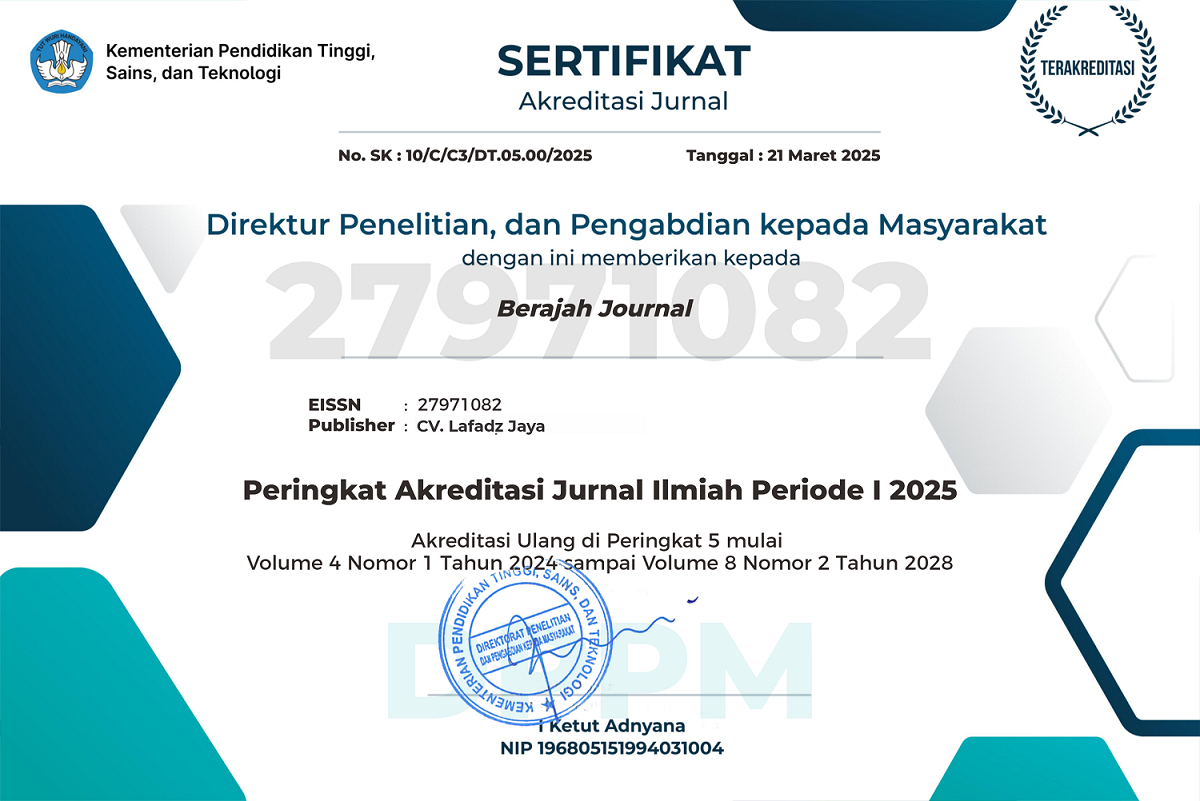PENGARUH RESILIENCE DAN LEADER SAFETY COMMITMENT TERHADAP JOB REATTACHMENT KARYAWAN DI MASA PANDEMI COVID-19
DOI:
https://doi.org/10.47353/bj.v2i3.126Keywords:
job reattachment, resilience, LSCAbstract
Penelitian ini bertujuan untuk mengetahui pengaruh resilience dan leader safety commitment terhadap job reattachment pada karyawan di masa pandemic covid-19. Penelitian ini dilakukan pada karyawan yang sebelumnya pernah menjalani work from home dan saat ini kembaii melakukan work from office. Penelitian ini menggunakan pendekatan kuantitatif dengan metode survei. Jumlah partisipan sebanyak 200 orang. Data pada penelitian ini dianalisis dengan uji regresi linear sederhana dan uji regresi linear berganda menggunakan bantuan palikasi IBM SPSS Statistics 21 for Windows. Adapun hasil dari penelitian ini menyatakan bahwa secara linear resilience dan leader safety commitment berpengaruh positif dan signifikan terhadap job reattachment. Serta Ketika diteliti secara linear berganda hasil menunjukkan bahwa resilience dan leader safety commitment memiliki pengaruh positif dan signifikan terhadap job reattachment
Downloads
References
Arifin, A. (2021, January 27). Masih Cemas Covid-19, Banyak Karyawan Enggan Kembali Bekerja di Kantor. VoA Indonesia. https://www.voaindonesia.com/a/masih-cemas-covid-19-banyak-karyawan-enggan-kembali-bekerja-di-kantor/5753467.html
Ashforth, B. E., Kreiner, G. E., & Fugate, M. (2000). All in a Day’s Work: Boundaries and Micro Role Transitions. The Academy of Management Review, 25(3), 472. https://doi.org/10.2307/259305
Beus, J. M., Payne, S. C., Arthur, W., & Muñoz, G. J. (2019). The Development and Validation of a Cross-Industry Safety Climate Measure: Resolving Conceptual and Operational Issues. Journal of Management, 45(5), 1987–2013. https://doi.org/10.1177/0149206317745596
Fritz, C., & Taylor, M. (2020). Detaching from and reattaching to work: The dance of work-nonwork balance. Organizational Dynamics, 49(4). https://doi.org/10.1016/j.orgdyn.2019.04.010
Hobfoll, S. E. (1989). Conservation of Resources: A New Attempt at Conceptualizing Stress. American Psychologist, 44(3), 513–524. https://doi.org/10.1037/0003-066X.44.3.513
Indonesia, C. (2021, February 18). Alasan Berkutat dengan Hobi Baik Untuk Kesehatan Mental. Cnnindonesia.Com. https://www.cnnindonesia.com/gaya-hidup/20210217160712-284-607463/alasan-berkutat-dengan-hobi-baik-untuk-kesehatan-mental
Iqbal, M. (2021, March 12). Pandemi Covid-19 Bikin Karyawan Cari Kerjaan Baru Demi Gaji. CNBC Indonesia. https://www.cnbcindonesia.com/lifestyle/20210312091539-33-229600/pandemi-covid-19-bikin-karyawan-cari-kerjaan-baru-demi-gaji
Kahn, W. A. (1990). Psychological Conditions of Personal Engagement and Disengagement at Work. Academy of Management Journal, 4(33), 692–724. https://doi.org/https://doi.org/10.5465/256287
Khoiri Oktavia, W., & Muhopilah, P. (2021). Model Konseptual Resiliensi di Masa Pandemi Covid-19: Pengaruh Religiusitas, Dukungan Sosial dan Spiritualitas. Psikologika: Jurnal Pemikiran Dan Penelitian Psikologi, 26(1), 1–18. https://doi.org/10.20885/psikologika.vol26.iss1.art1
Listya Astika, N. F., & Saptoto, R. (2018). Peran Resiliensi dan Iklim Organisasi terhadap Work Engagement. Gadjah Mada Journal of Psychology (GamaJoP), 2(1), 38. https://doi.org/10.22146/gamajop.31868
Luthans, F., Avolio, B. J., Avey, J. B., & Norman, S. M. (2007). Positive psychological capital: Measurement and relationship with performance and satisfaction. Personnel Psychology, 60(3), 541–572. https://doi.org/10.1111/j.1744-6570.2007.00083.x
Luthans, F., & Youssef, C. M. (2007). Emerging positive organizational behavior. Journal of Management, 33(3), 321–349. https://doi.org/10.1177/0149206307300814
Luthans, F., Youssef, C. M., & Avolio, B. J. (2007). Psychological Capital: Developing the Human Competitive Edge. In Psychological Capital: Developing the Human Competitive Edge. https://doi.org/10.1093/acprof:oso/9780195187526.001.0001
Nolan, M. (2019). Preparing For The Workday: The Effects Of Pre-Work Strategies On Psychological Engagement and Well-Being. Disertation.
Ojo, A. O., Fawehinmi, O., & Yusliza, M. Y. (2021). Examining the predictors of resilience and work engagement during the covid-19 pandemic. Sustainability (Switzerland), 13(5), 1–18. https://doi.org/10.3390/su13052902
Putri, K. R. (2020). Mengelola Stress Pegawai di Tengah Pandemi Covid-19. Djkn.Kemenkeu.
Rutter, M. (1987). Psychosocial Resilience and Protective Mechanism. American Journal of Orthopsychiatry, 3(57), 316–331. https://doi.org/10.1111/j.1939-0025.1987.tb03541.x
Sonnentag, S., Eck, K., Fritz, C., & Kühnel, J. (2020). Morning Reattachment to Work and Work Engagement During the Day: A Look at Day-Level Mediators. Journal of Management, 46(8), 1408–1435. https://doi.org/10.1177/0149206319829823
Sonnentag, S., & Kühnel, J. (2016). Coming back to work in the morning: Psychological detachment and reattachment as predictors of Work engagement. Journal of Occupational Health Psychology, 21(4), 379–390. https://doi.org/10.1037/ocp0000020
Vitniawati, V., & Jamiyanti, A. (2021). Status Mental Emosional Karyawan Universitas Bhakti Kencana Saat Menjalani Work From Office. Jurnal Psikologi Insight, 5(1), 100–105. https://ejournal.upi.edu/index.php/insight/article/view/34248
Yuan, Z., Ye, Z., & Zhong, M. (2021). Plug back into work, safely: Job reattachment, leader safety commitment, and job engagement in the COVID-19 pandemic. Journal of Applied Psychology, 106(1), 62–70. https://doi.org/10.1037/apl0000860
Downloads
Published
How to Cite
Issue
Section
License
Copyright (c) 2022 Nur Khofifah Milenia Safitri, Seger Handoyo

This work is licensed under a Creative Commons Attribution 4.0 International License.






















